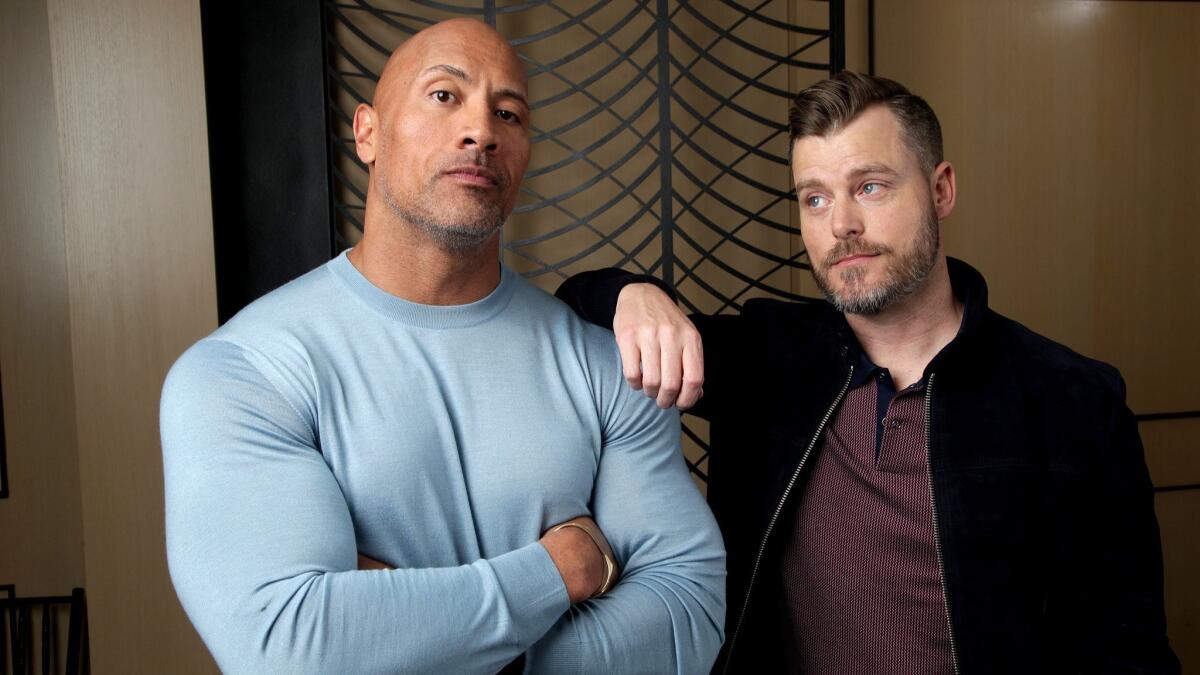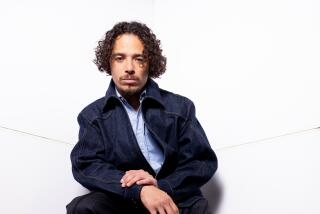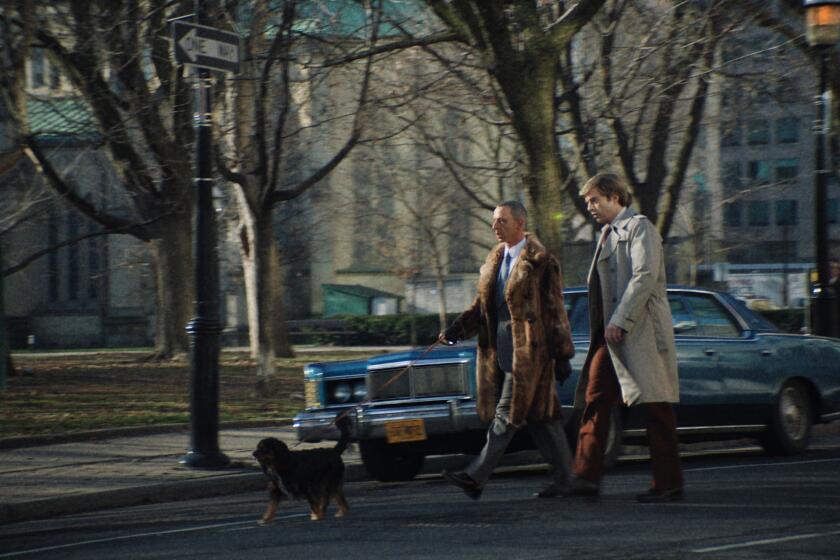Dwayne Johnson and Rawson Marshall Thurber on ‘Skyscraper’ and the state of Hollywood

Throughout his movie career, Dwayne Johnson has squared off against all manner of threats, from giant monsters to ancient armies to earthquakes, firmly establishing himself as the king of the action-movie hill with more than $9.4 billion in global box-office grosses to his name.
Now, with his latest film, Johnson is going up against one of the most powerful forces Hollywood can throw at him: sequelitis.
Out of eight movies that the major studios will release in the month of July, only one is not either a sequel or an outgrowth of an existing property: Johnson’s “Skyscraper,” the rare big-budget tentpole based on original material in this entire franchise-saturated summer.
“Skyscraper,” which hits theaters July 13, stars Johnson as a former FBI agent and amputee named Will Sawyer who is hired as the head of security at the world’s tallest building, a Hong Kong tower called The Pearl. When the high-tech skyscraper comes under attack by a criminal syndicate, Sawyer must save his family before a raging fire consumes the entire building.
If that plot description gives you flashbacks to “Die Hard,” that’s no accident. From the start, writer and director Rawson Marshall Thurber — who directed Johnson in the 2016 action-comedy hit “Central Intelligence” and will soon reunite with him again on a heist movie called “Red Notice” — conceived of the film as a loving homage to the kind of meat-and-potatoes action movies that were a staple of the multiplexes in the heyday of Bruce Willis, Sylvester Stallone and Arnold Schwarzenegger.
“I hope that this movie is going to feel fresh in its familiarity, which I think is a real sweet spot,” Thurber said on a recent afternoon at a hotel in Bel-Air, as Johnson — who famously eats up to seven meals a day to fuel his herculean workouts — sat beside him picking at a plate of food. “These kinds of movies aren’t made anymore, which I think is a mistake. And in a summer that’s just chockablock with superhero, superhero, sequel, sequel, sequel, it’s something different.”
“There are 10 sequels on the left and right of us in our release window, which is really sobering in a way,” said “Skyscraper” producer Beau Flynn. “It’s so important to us to make original movies and try to create something different. And a huge part of why we get to do that is Dwayne Johnson.”
Along with Johnson’s formidable box office muscle, “Skyscraper” — which was the subject of a heated bidding war among the major studios and will be released by Universal Pictures and Legendary Entertainment, owned by Chinese conglomerate Dalian Wanda Group — is also poised to leverage the growing box office might of the Asian moviegoing market. The film even scored a coveted July release in China — where Johnson’s April release “Rampage” handily outgrossed its domestic haul — a lucrative time period usually reserved for local productions.
At a time when studios are increasingly looking for any way to appeal to Chinese moviegoers, though, producer Hiram Garcia says that setting the film in Hong Kong was every bit as much a creative decision as a business calculation.
“Dwayne is as real-life of a walking superhero as you’ll ever find, so when you want to create a strong opposition for him you have to kind of stack the deck against him,” said Garcia. “Putting him out of his element in a foreign country, not knowing the language — all of that kind of raised the stakes.”
The Times spoke with Johnson and Thurber about the challenge of trying to bring back the old-school action movie in today’s era of Rotten Tomatoes scores, generally dwindling movie-star drawing power and comic-book franchise overkill.
What was the original germ of this idea?
Thurber: When I was in post-production on “Central Intelligence,” I saw “Creed,” and I loved it. I started watching a bunch of Sylvester Stallone pictures and one of them was Renny Harlin’s [1993 action film] “Cliffhanger,” which I remember loving when I was a kid.
Watching it again, there’s this great cold open where Stallone is a rock climber and he’s out on the wire and he’s trying to save the girl and her glove comes off and she falls to her death. It’s just a shocking way to open. I really love that idea of the hero who doesn’t save the day in the beginning and that failure haunts him or her through the rest of the story, and the story itself is a way of exorcising that demon. I thought, I haven’t seen that in a long time.
I just love action movies. I’ve wanted to make one since I was 8 years old. “Die Hard” is one of my all-time favorite films. I could do the whole movie right now if you’d like.
Johnson: [deadpan] Please don’t.
Dwayne, what hooked you about the idea?
Johnson: Rawson gave me a preamble of what it was and immediately I was in, because it was different, it was fresh, it was cool. It had this clear reverence for movies we loved, like “The Towering Inferno” and “Die Hard” and “The Fugitive,” and it felt like it had the potential to be something that audiences really liked.
At the end of this 45-minute pitch, I go, “Wow, I love it.” And then about a minute later, Rawson goes, “Oh, one more thing: Remember the explosion at the beginning? Well, you lost your leg, and you’re doing all this as an amputee.” That automatically brought an interesting dynamic, and I just loved the idea of that challenge as an actor.
Thurber: For me, I was really excited to show Dwayne in a way he hasn’t been seen before. Most of the pictures he does, he’s a superhero without a cape. He’s bulletproof — literally, sometimes, and figuratively, others. That’s great, and he does it better than anybody on the planet. But what I was interested in is, how do we get the most vulnerable performance from him? How do we get Dwayne to think his way out of a problem rather than punch his way out of it?
How much of the decision to set the movie in Hong Kong was for creative reasons and how much was driven by box office considerations and the importance of the Chinese market?
Thurber: It was kind of hand in glove. Obviously, you want to pay attention to the fact that it’s a huge market and that matters. But for me, Hong Kong is an incredibly vertical city so it seemed to fit there. Setting it in China was not by happenstance, but it certainly wasn’t a case of the tail wagging the dog by any stretch. I wanted it to feel as real and in the soil as possible, which is why we have the cops speaking to each other in Cantonese.
Johnson: The studio immediately saw the business end of it. China will probably overtake the U.S. as the biggest market in the world in the next 24 months. But as Rawson was writing it, you had the sense that he wasn’t constructing it in Hong Kong just for the sake of that. It was a real love letter to that city.
This movie is one of the only big-budget studio tentpoles this summer that isn’t a sequel. Dwayne, in the current climate, is it getting rarer to come across original scripts like this?
Johnson: Well, the original scripts that are coming in are certainly not coming in at this size and scale. Of course, in today’s market there are superhero movies and sequels and big franchises, which work very well and they’re very entertaining, and it’s what we do. But with “Skyscraper,” the original IP [intellectual property] made it very appealing. I think there was also something interesting to the studios in that we were going to be cost-conscious and create a summer movie that didn’t have to be $250 million. You could cut that in half and it would still feel like a big, entertaining movie.
With a movie like this, you take a shot. No, we don’t have capes, and no, there’s not a lot of green screen. This movie has a throwback feel to it. It feels like it has some potential to do well. I think we have to just manage expectations and make sure that we’re not inaccurately comped to other things. That way, whatever the box office comes in at, it’s going to be a win.
Dwayne, “Skyscraper” rests almost entirely on your shoulders in terms of your drawing power. You’re one of the only stars left who a studio would conceivably make that kind of bet on. Does that feel like a lot of pressure?
Johnson: I mean, it comes with the territory and the position. But there’s a lot of confidence that I have in the team and the material. The writer-director, a great producing team, a great studio in Universal and Legendary — there are a lot of components that I can rest on.
I like to take big swings. For me, the goal is always to impact as many lives as possible in the most entertaining way. You roll the dice and sometimes it works, like a “Jumanji” or like a “Central Intelligence,” and sometimes it doesn’t, like a “Baywatch” or like a “Doom.”
My gut and my instinct is the only thing I go by: Does this resonate with me and do I think audiences around the world will enjoy it? I’m an emotional guy, and if I feel like if my energy is in the right place, my mana — which in the islands means “spirit” — that’s a very powerful thing.
With “Baywatch” in particular, you argued there was a disconnect between what critics thought of the movie and what audiences thought. There’s been a lot of talk in recent years about the “Rotten Tomatoes effect” and how much of an impact that can have on a movie’s box office. With a movie like “Skyscraper,” how much do you think about critics versus the general audience?
Thurber: That was one of the big lessons I learned from working with Dwayne: It’s audience first, always and almost only. We can’t control what critics are going to say. All we can do is make the best movie we can.
Johnson: With “Baywatch,” it’s not that critics didn’t like it — they … hated it. [laughs] But to clarify, it’s not audience first, critics never. Critics love movies, and we’re all in this business together. I know a lot of critics. They’re my buddies. It’s not an easy job. Everybody’s got a job to do. Even the executives who are in charge of the spreadsheets at the studios — we all love movies.
This might be an ironic question to end on given all the talk about the appeal of original material. But do you see a potential franchise in “Skyscraper” where we’d follow this character into other adventures?
Johnson: We talked about it early, and I think one of the things we didn’t want to get pulled into was the pitfall of: Let’s try to build out a franchise universe. From my perspective, there was a beginning, a middle and an end, and that was what we’re making.
Thurber: I mean, if they can make a sequel to “Die Hard,” you can make a sequel to anything. I guess I would just say never say never. I hope we have the opportunity to make that choice. But we’ll take it as it comes.
This interview has been edited and condensed.
Twitter: @joshrottenberg
More to Read
Only good movies
Get the Indie Focus newsletter, Mark Olsen's weekly guide to the world of cinema.
You may occasionally receive promotional content from the Los Angeles Times.











